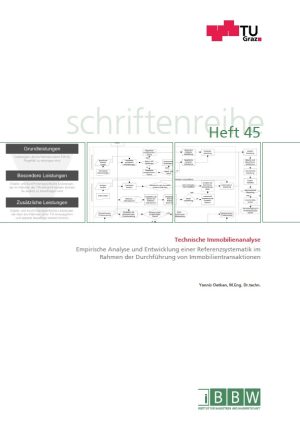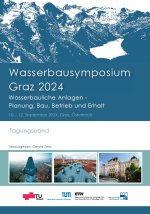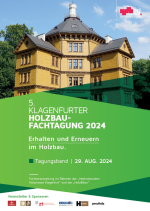The technical due diligence (TDD) represents a central element of the property inspection in the context of real estate transactions and deals intensively with the building construction and technology as well as building law aspects of a property. However, literature analyses and the evaluation of existing reports have shown that there is no uniform market understanding of the content and depth of testing of the TDD. The present work analyses the essential aspects of the TDD on the basis of guideline-based expert interviews. In addition to the essential aspects, the focus is on the procedural design and the necessary qualifications. The research work is rounded off by the development of a data model that contributes to the digitalization of the overall pro-cess.
Based on the findings from the survey of transaction managers and technical experts in the TDD, a process model was developed that, on the one hand, depicts the central process steps and, on the other hand, shows the responsibilities of the various parties and thus illus-trates the necessary strands of handling. In addition, quality gates were defined at which decisions about continuing, cancelling or speci-fying the findings must be made. The central sub-process of system and component evaluation supplements the general TDD process. This specifies the different assessments of status, life cycle and test-ing at the system and component level.
As part of the content model, it was possible to extract the different service areas and their service components. For each of the ten ser-vice areas, the basic services to be provided within the framework of the TDD could be defined, and additional and special services beyond this were described. On this basis, it is possible to create a uniform definition basis for the TDD. The content model is supplemented by the discussion of the necessary qualifications of the technical experts in the TDD reports.
The chapter of digitization deals on the one hand with data and infor-mation provision and on the other hand with data and information eval-uation. To optimize the provision, a data model was developed for the sub-area of system and component evaluation, which defines the con-tent of a digital interface between the object data record and TDD. Based on this, potentials for the partially automated evaluation were shown for the system and component evaluation process. The central point here is that the automated evaluations optimize the decision-making basis for the technical experts.
Empirische Analyse und Entwicklung einer Referenzsystematik im Rahmen der Durchführung von Immobilientransaktionen
Issue: Open Access E-Book
ISBN: 978-3-85125-900-1
Language: Deutsch
Release date: May 2023
Series: Schriftenreihe des Instituts für Baubetrieb und Bauwirtschaft, Issue 45
The technical due diligence (TDD) represents a central element of the property inspection in the context of real estate transactions and deals intensively with the building construction and technology as well as building law aspects of a property. However, literature analyses and the evaluation of existing reports have shown that there is no uniform market understanding of the content and depth of testing of the TDD. The present work analyses the essential aspects of the TDD on the basis of guideline-based expert interviews. In addition to the essential aspects, the focus is on the procedural design and the necessary qualifications. The research work is rounded off by the development of a data model that contributes to the digitalization of the overall pro-cess.
Based on the findings from the survey of transaction managers and technical experts in the TDD, a process model was developed that, on the one hand, depicts the central process steps and, on the other hand, shows the responsibilities of the various parties and thus illus-trates the necessary strands of handling. In addition, quality gates were defined at which decisions about continuing, cancelling or speci-fying the findings must be made. The central sub-process of system and component evaluation supplements the general TDD process. This specifies the different assessments of status, life cycle and test-ing at the system and component level.
As part of the content model, it was possible to extract the different service areas and their service components. For each of the ten ser-vice areas, the basic services to be provided within the framework of the TDD could be defined, and additional and special services beyond this were described. On this basis, it is possible to create a uniform definition basis for the TDD. The content model is supplemented by the discussion of the necessary qualifications of the technical experts in the TDD reports.
The chapter of digitization deals on the one hand with data and infor-mation provision and on the other hand with data and information eval-uation. To optimize the provision, a data model was developed for the sub-area of system and component evaluation, which defines the con-tent of a digital interface between the object data record and TDD. Based on this, potentials for the partially automated evaluation were shown for the system and component evaluation process. The central point here is that the automated evaluations optimize the decision-making basis for the technical experts.
These could also be of interest to you
- Catalog
- New releases
-
Open Access publications

- Enhanced e-books
-
Series
- Akademische Reden an der Technischen Universität Graz
- Arbeitshilfen für die Praxis
- Archiv und Bibliothek
- Betonkolloquium
- Buddhist Architecture in the Western Himalayas
- BWL Schriftenreihe
- Electrical Power Systems
- Fachbücher Planung und Bau
- Facts & Figures
- Festschriften TU Graz
- Forschungsreihe IBBW
- Forum Technik und Gesellschaft
- Geodesy
- Immersive Learning Research Network Conference; Workshop, short papers, poster
- Institut für Gebäudelehre Jahrbuch
- International Brain-Computer Interface (BCI) Meeting
- LM.VM.2014
- Logistik Werkstatt Graz
- Materialien zu Schwerpunkten am Institut für Gebäudelehre
- Mathematical Modelling of Weld Phenomena
- Monographic Series TU Graz
- Monographic Series TU Graz|Advanced Materials Science
- Monographic Series TU Graz|Computation in Engineering and Science
- Monographic Series TU Graz|Production Science and Management
- Monographic Series TU Graz|Railway Research
- Monographic Series TU Graz|Reihe Fahrzeugtechnik
- Monographic Series TU Graz|Schriftenreihe des Instituts Betonbau
- Monographic Series TU Graz|Structural Analysis
- Monographic Series TU Graz|Techno- und sozioökonomisch orientierte Betriebswirtschaft
- Monographic Series TU Graz|Technoökonomie und industrielles Management
- Monographic Series TU Graz|Timber Engineering & Technology
- November Talks
- Proceedings of the International Brain-Computer Interface
- Schriftenreihe des Instituts für Baubetrieb und Bauwirtschaft
- Schriftenreihe des Instituts für Straßen- und Verkehrswesen
- Schriftenreihe des Instituts für Wohnbau der TU Graz
- Schriftenreihe zur Wasserwirtschaft
- Science, Technology and Society online
- Seminarreihe Bauunternehmensführung
- Studien zur Architektur | TU Graz
- Textbook Series
- Transform Industry: Guiding the transformation of SMEs
- TU Graz Jahresbericht | Annual report
- TU Graz people
- TU Graz Research
- VKM-THD Mitteilungen; IVT-Mitteilungen ab Bd. 100
- Authors
- Sale
Contact
Verlag der
Technischen Universität Graz
Technikerstraße 4
8010 Graz, Österreich
UID(VAT) ATU 57477929
contact person
Gabriele Groß
Tel.: +43(0)316 873 6157
E-Mail: verlag [ at ] tugraz.at
Privacy Overview
Necessary cookies are absolutely essential for the website to function properly. These cookies ensure basic functionalities and security features of the website, anonymously.
| Cookie | Dauer | Beschreibung |
|---|---|---|
| cookielawinfo-checkbox-analytics | 11 months | This cookie is set by GDPR Cookie Consent plugin. The cookie is used to store the user consent for the cookies in the category "Analytics". |
| cookielawinfo-checkbox-functional | 11 months | The cookie is set by GDPR cookie consent to record the user consent for the cookies in the category "Functional". |
| cookielawinfo-checkbox-necessary | 11 months | This cookie is set by GDPR Cookie Consent plugin. The cookies is used to store the user consent for the cookies in the category "Necessary". |
| qtrans_front_language | 1 year | This cookie is set by qTranslate WordPress plugin. The cookie is used to manage the preferred language of the visitor. |
| viewed_cookie_policy | 11 months | The cookie is set by the GDPR Cookie Consent plugin and is used to store whether or not user has consented to the use of cookies. It does not store any personal data. |
| woocommerce_cart_hash | session | This cookie is set by WooCommerce. The cookie helps WooCommerce determine when cart contents/data changes. |
Analytical cookies are used to understand how visitors interact with the website. These cookies help provide information on metrics the number of visitors, bounce rate, traffic source, etc.
| Cookie | Dauer | Beschreibung |
|---|---|---|
| _pk_id | 1 year 27 days | Required for the operation of Matomo, an analysis tool that tracks and analyzes user behavior. |
| _pk_ref | 13 months | Required for the operation of Matomo, an analysis tool that tracks and analyzes user behavior. |
| _pk_ses | 30 minutes | Required for the operation of Matomo, an analysis tool that tracks and analyzes user behavior. |
Other uncategorized cookies are those that are being analyzed and have not been classified into a category as yet.
| Cookie | Dauer | Beschreibung |
|---|---|---|
| yt-remote-connected-devices | never | No description available. |
| yt-remote-device-id | never | No description available. |







